Some cellphone cases are designed to be stylish, some cases are designed with function in mind. Some companies eschew size for durability and design cases to conform with military specifications for protection against impact, dust, and water. Otterbox is one of those companies.
My Un-met Case Need
Although my everyday life is hardly considered a battlefield, I do like the outdoors. I also like my Treo 650. Hiking, fragile electronics, and me do not have a good track record together. My 650 needs military-grade defense from my meredyth-grade clumsiness. When I saw that Otterbox released a case specifically designed to protect the Treo under harsh conditions, I decided to give it a try.
First Impressions
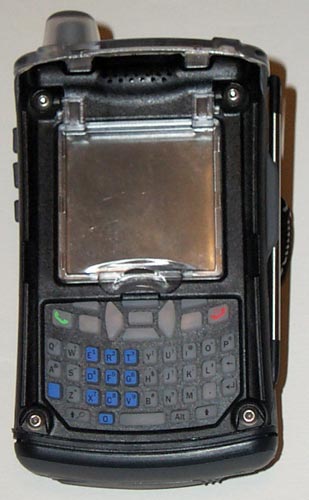
Constructed from black ABS plastic and grey rubber grips, the Otterbox 1920 Treo Case is a crush resistant, drop resistant case made for the Treo 650 and 700 models.
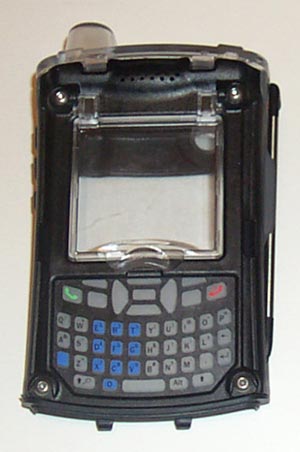
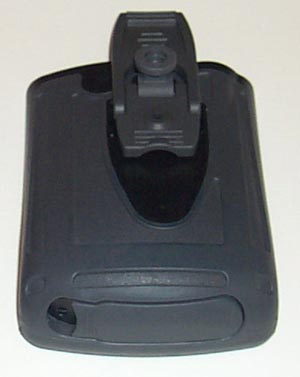
The screen is protected by two layers: a ridged external panel to protect the LCD from physical harm which flips up for access to the internal soft “membrane” that safeguards the screen against liquid damage while allowing interaction with a stylus. The stylus is stored externally by a clip along the right side.
Just like a tank is not the most efficient way to transport 4 people, the 1920 is not the smallest case on the market. It is substantial in size as well as in protective features. From antenna to microphone, this case wards your smartphone from drops and weather.
To give you a size reference for the case, here is my ex-football-player-turned-geek husband dramatically modeling the Otterbox 1920.

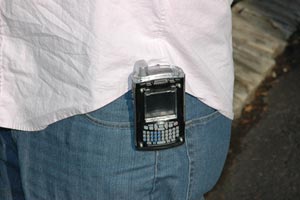
My first thought after opening the package that contained my Otterbox 1920 was “Can I actually carry this around?” After a quick bit of research on the Otterbox site, I discovered that there is a belt clip kit available, which I decided to also review with the case.
The belt clip accessory kit is sold separately ($19.95) and includes the tools necessary to install the clip on the rear shell.
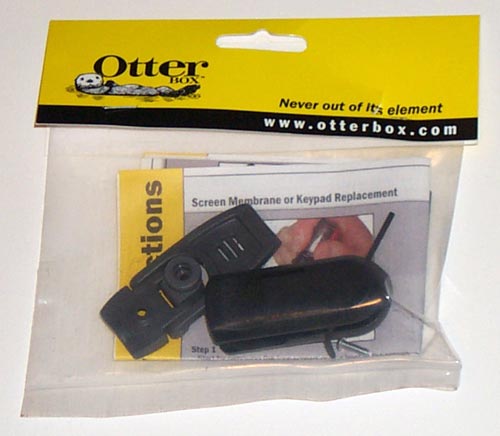
Installation and Usage
I’ve been using the 1920 for the past few weeks in a variety of situations. To assemble the case, insert your Treo into the top half of the shell so that the camera lens on the back of the phone lines up with the clear portal in the back of the case.
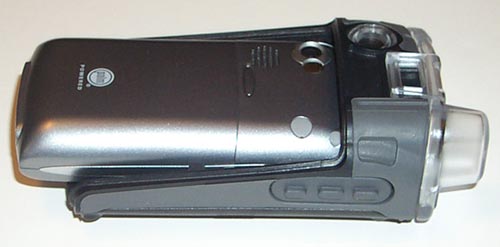
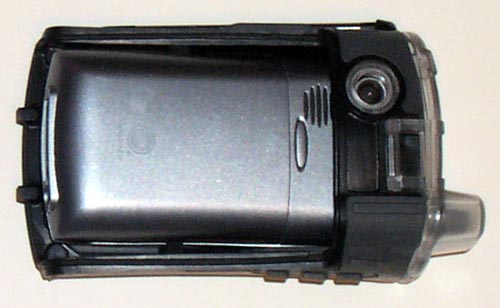
Then, starting at the bottom, slide on the rear panel.
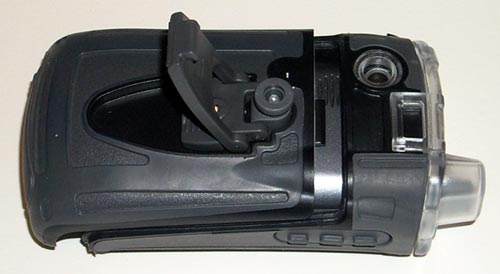
To seal the case, hook the latch into place.
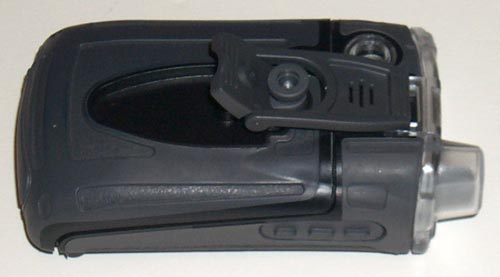
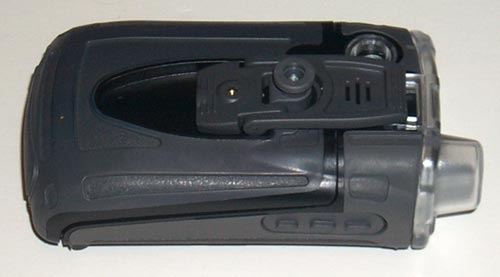
The belt clip kit has clear instructions that make installation easy. There are a few parts on the rear portion of the case that are swapped out to accommodate the clip. Once installed, the clip withstands over 130 pounds of force and the release mechanism is difficult to inadvertently engage.
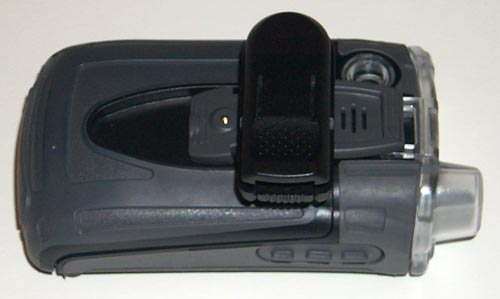
Palm Functionality
Despite its size, the 1920 feels good in the hand. External buttons on the case make the keypad accessible, it took me a bit of time to get acclimated to using the keypad as some of the keys are not marked.
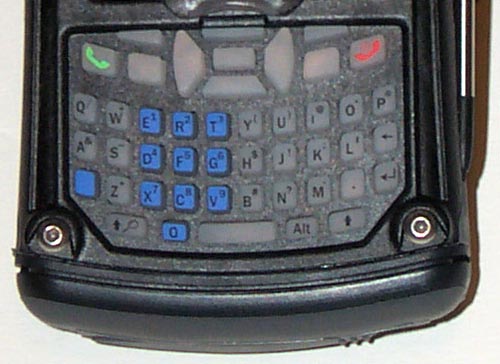
The side selection keys are also usable through the case.

One major drawback is that the ringer mute switch is covered by the acrylic top and the case must be removed to access.
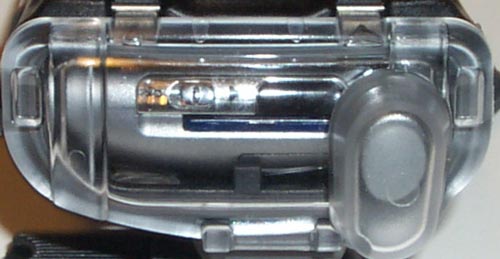
The outside of the case has a place to hold a stylus. I used an old spare stylus while testing, in the event that the clip did not hold. During my weeks of testing, the stylus held firmly in place, yet easy to remove when I needed it.
The internal screen membrane is thicker than most screen protectors and requires slightly more stylus pressure. This extra thickness is to protect the screen from water and dust, so I think that it’s a good trade-off. However, if you use a fingernail as a selection tool on the screen it is very difficult through the membrane. The screen is slightly less bright through the membrane, but not significantly more than other screen protectors that I’ve used in the past.
Phone Functionality
Again, even though the 1920 case is bulky, the rubber grips made it comfortable to hold up to my ear while using the phone.
However, the protective shielding within the Otterbox 1920 does dampen the sound on the microphone and speakers quite a bit. I’ve found three workarounds to this drawback: First, bluetooth headsets work very well while using the 1920 case. I have not observed any signal problems while testing with a variety of headsets.
Second, there is a Palm utility called VolumeCare. I downloaded a trial version of this while testing, and this utility does the trick of making the volume loud enough to overcome the dampening effect of the case. As a side note, I like this utility solution so much, I may purchase a license when my trial period runs out.
Lastly, the bottom of the case has a moveable rubber flap so that a wired hands-free headset can be used. This flap also allowed for syncing and charging through the case. Any of these solutions solved the problem sufficiently for me.
Life Functionality
One of the things I liked the most about this case is the security I felt while using it. While clipped onto my pocket, I accidentally ran into numerous doors, tripped down stairs and got caught in the rain. The entire time my phone was secure and dry. During my adventure with a flight of stairs, I lost a shoe but my 1920 stayed clipped to my pocket! I likely will not use this case everyday, but it’s going with me whenever I go hiking, to amusement parks, or the beach.
Palm Phone PVG100 (The Small Premium Unlocked Phone) with 32GB Memory and 12MP Camera (Gold)
(as of February 15, 2026 17:53 GMT -06:00 - More infoProduct prices and availability are accurate as of the date/time indicated and are subject to change. Any price and availability information displayed on [relevant Amazon Site(s), as applicable] at the time of purchase will apply to the purchase of this product.)Palm Tungsten E2 Handheld
(as of February 15, 2026 17:53 GMT -06:00 - More infoProduct prices and availability are accurate as of the date/time indicated and are subject to change. Any price and availability information displayed on [relevant Amazon Site(s), as applicable] at the time of purchase will apply to the purchase of this product.)Product Information
| Price: | 129.95 |
| Manufacturer: | OtterBox |
| Retailer: | OtterBox |
| Requirements: |
|
| Pros: |
|
| Cons: |
|



Gadgeteer Comment Policy - Please read before commenting
Post your comments on the Otterbox 1920 Case for the Treo 650 and 700 review.
http://www.the-gadgeteer.com/review/otterbox_1920_treo_case
Just click the POST REPLY button on this page.
We’re trying to figure out how to take off the “easy to remove clear top cover”, so that we can get to the vibrate button? Can you help us?
Thank you!
Hi Lisa!
I wrote the review for this product so I’l be happy to answer any questions that you have.
Unfortunately, the acrylic top is not (to my knowledge) removable so the entire case must be removed to access the vibrate switch. This was a big drawback for me.
The case that I reviewed was one of the very first to be shipped after the 1920 product launch. Otterbox sometimes makes changes to their designs over time so you may benefit from checking out the Otterbox Knowledge Base: http://www.otterbox.com/knowledge_base/
Hope this helps!